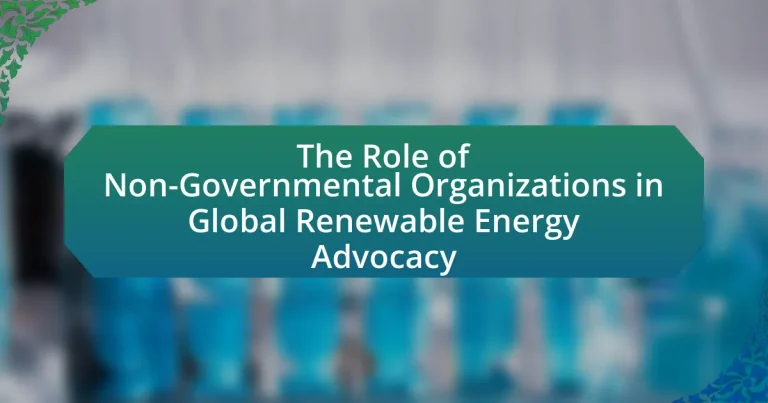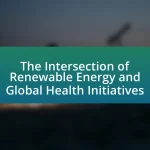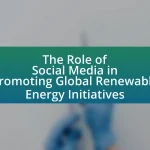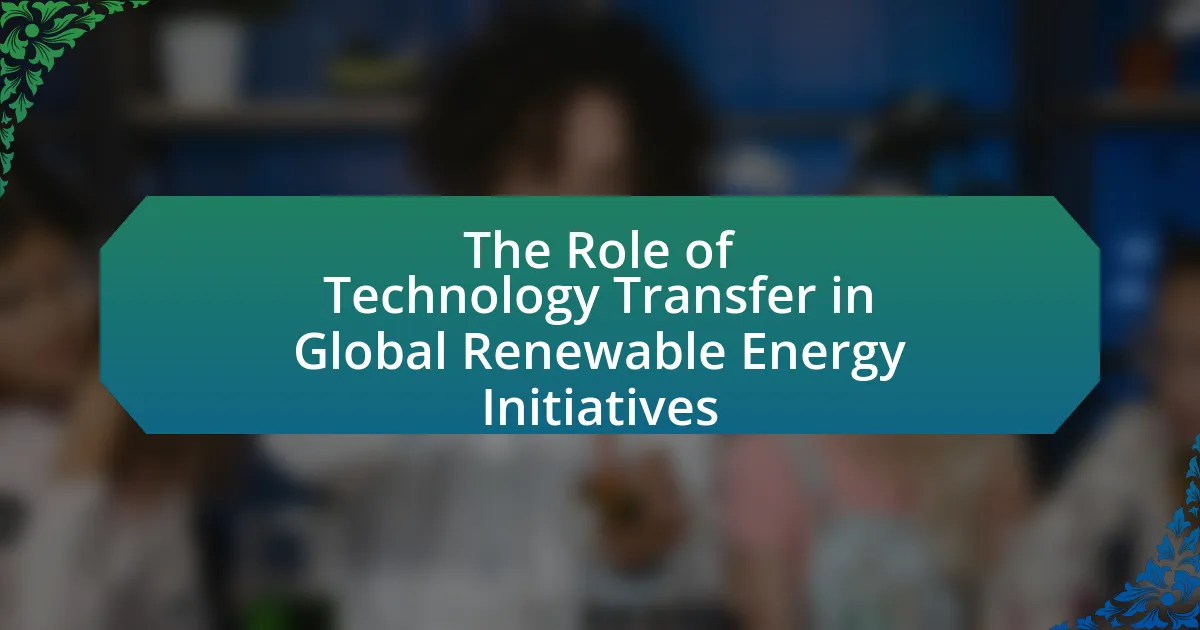Non-Governmental Organizations (NGOs) play a vital role in global renewable energy advocacy by promoting sustainable energy practices, influencing policy, and raising public awareness. They engage in research, provide expertise, and mobilize communities to support renewable energy initiatives, as demonstrated by organizations like Greenpeace and the World Wildlife Fund. The article explores how NGOs contribute to renewable energy initiatives through advocacy, funding, and community engagement, while also addressing challenges such as limited funding and political resistance. Additionally, it highlights the importance of international cooperation, innovative approaches, and community engagement in enhancing the effectiveness of NGO-led renewable energy efforts.
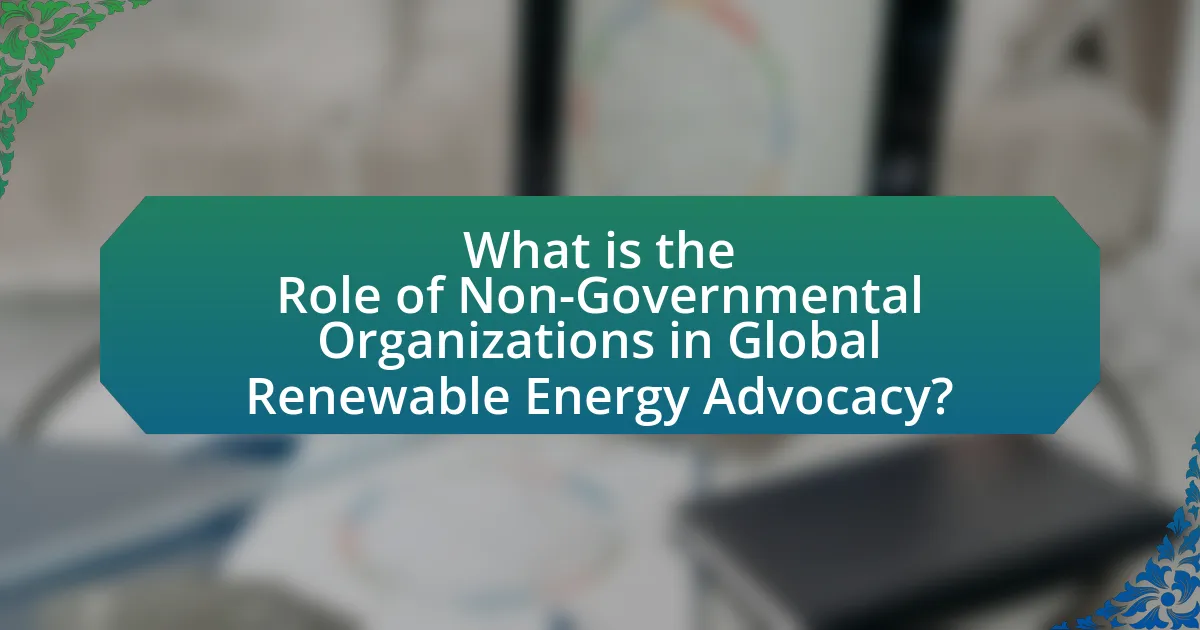
What is the Role of Non-Governmental Organizations in Global Renewable Energy Advocacy?
Non-Governmental Organizations (NGOs) play a crucial role in global renewable energy advocacy by promoting sustainable energy practices, influencing policy, and raising public awareness. They engage in research, provide expertise, and mobilize communities to support renewable energy initiatives. For instance, organizations like Greenpeace and the World Wildlife Fund actively campaign for renewable energy policies and practices, contributing to significant legislative changes in various countries. Their efforts have been instrumental in increasing investment in renewable technologies, as evidenced by the International Renewable Energy Agency reporting that global renewable energy capacity reached 2,799 gigawatts in 2020, largely due to advocacy from NGOs.
How do Non-Governmental Organizations contribute to renewable energy initiatives?
Non-Governmental Organizations (NGOs) contribute to renewable energy initiatives by advocating for policy changes, providing funding, and facilitating community engagement. NGOs like Greenpeace and the World Wildlife Fund actively lobby governments to adopt renewable energy policies, influencing legislation that promotes sustainable energy sources. Additionally, NGOs often secure grants and donations to finance renewable energy projects, such as solar installations in underserved communities. They also engage local populations through education and training programs, empowering communities to adopt renewable technologies. For instance, the Solar Electric Light Fund has implemented solar energy solutions in over 20 countries, demonstrating the tangible impact of NGO involvement in renewable energy initiatives.
What specific actions do these organizations take to promote renewable energy?
Non-governmental organizations (NGOs) promote renewable energy through advocacy, education, and project implementation. These organizations engage in lobbying for policy changes that support renewable energy initiatives, such as tax incentives and renewable energy standards. They also conduct educational campaigns to raise public awareness about the benefits of renewable energy sources, such as solar and wind power. Additionally, NGOs often partner with local communities to implement renewable energy projects, providing technical assistance and funding to facilitate the transition to sustainable energy solutions. For example, organizations like Greenpeace and the World Wildlife Fund have successfully influenced legislation and increased investment in renewable energy technologies globally.
How do NGOs collaborate with other stakeholders in the renewable energy sector?
NGOs collaborate with other stakeholders in the renewable energy sector through partnerships, advocacy, and capacity-building initiatives. These organizations often work with governments, private sector entities, and local communities to promote sustainable energy solutions. For example, NGOs like Greenpeace and the World Wildlife Fund engage in policy advocacy to influence legislation and promote renewable energy adoption, while also providing technical assistance and resources to local communities for implementing renewable projects. This collaborative approach is supported by data indicating that multi-stakeholder partnerships can enhance project effectiveness and increase access to renewable energy, as seen in initiatives like the UN’s Sustainable Energy for All program, which emphasizes the importance of inclusive partnerships in achieving energy goals.
Why are Non-Governmental Organizations important in the context of renewable energy?
Non-Governmental Organizations (NGOs) are crucial in the context of renewable energy because they advocate for sustainable practices, influence policy, and mobilize public support. NGOs often conduct research, raise awareness, and provide expertise that drives the adoption of renewable energy technologies. For instance, organizations like Greenpeace and the World Wildlife Fund have successfully campaigned for renewable energy policies, leading to significant legislative changes in various countries. Their efforts contribute to the global transition towards cleaner energy sources, as evidenced by the increase in renewable energy investments, which reached $303.5 billion in 2020 according to the International Energy Agency.
What unique perspectives do NGOs bring to renewable energy advocacy?
NGOs bring diverse perspectives to renewable energy advocacy by emphasizing social equity, environmental justice, and community engagement. These organizations often prioritize the needs of marginalized communities, ensuring that renewable energy initiatives are inclusive and equitable. For instance, NGOs like Greenpeace and the World Wildlife Fund advocate for policies that not only promote renewable energy but also address the socio-economic impacts on vulnerable populations. Their grassroots connections enable them to mobilize local support and raise awareness about the benefits of renewable energy, thereby influencing policy decisions. Additionally, NGOs often conduct independent research and provide data-driven insights that highlight the urgency of transitioning to renewable energy sources, reinforcing their role as credible advocates in the energy sector.
How do NGOs influence policy and public opinion regarding renewable energy?
NGOs influence policy and public opinion regarding renewable energy through advocacy, education, and mobilization efforts. They engage in lobbying government officials to promote renewable energy legislation, often providing research and data to support their positions. For instance, organizations like Greenpeace and the World Wildlife Fund have successfully campaigned for renewable energy policies in various countries, leading to significant legislative changes. Additionally, NGOs conduct public awareness campaigns that highlight the benefits of renewable energy, thereby shaping public opinion and increasing demand for sustainable practices. Research indicates that public support for renewable energy often correlates with the efforts of NGOs to disseminate information and raise awareness about climate change and energy alternatives.
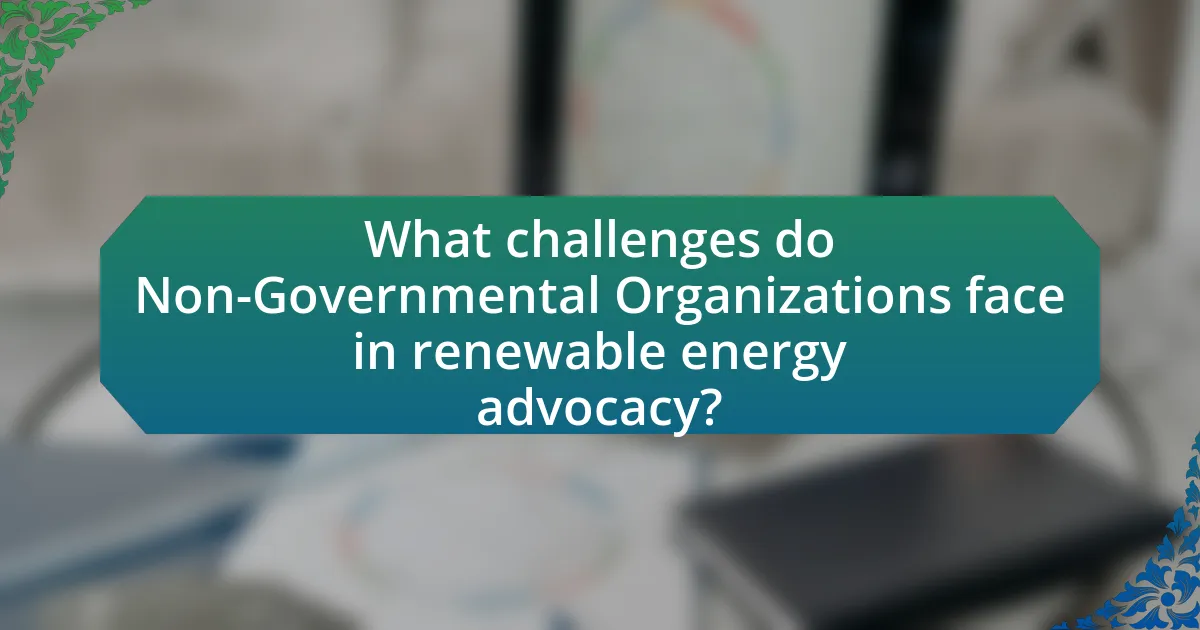
What challenges do Non-Governmental Organizations face in renewable energy advocacy?
Non-Governmental Organizations (NGOs) face several challenges in renewable energy advocacy, including limited funding, political resistance, and public awareness issues. Limited funding restricts their ability to implement projects and campaigns effectively, as many NGOs rely on donations and grants that may not be sufficient to cover operational costs. Political resistance often arises from government policies favoring fossil fuels or lack of support for renewable initiatives, making it difficult for NGOs to influence policy changes. Additionally, public awareness issues hinder advocacy efforts, as many individuals may lack understanding of renewable energy benefits, leading to lower engagement and support for initiatives. These challenges collectively impede the effectiveness of NGOs in promoting renewable energy solutions.
How do funding and resource limitations impact NGO efforts?
Funding and resource limitations significantly hinder NGO efforts by restricting their ability to implement projects, conduct research, and engage with communities. For instance, a lack of financial resources can lead to reduced staffing, limiting the expertise available to address renewable energy initiatives effectively. According to a 2020 report by the Global NGO Network, 70% of NGOs cited funding constraints as a primary barrier to achieving their objectives, which directly impacts their capacity to advocate for renewable energy policies and technologies. Additionally, resource limitations can result in diminished outreach and education efforts, reducing public awareness and engagement in renewable energy solutions.
What strategies do NGOs employ to overcome financial challenges?
NGOs employ diverse strategies to overcome financial challenges, including diversifying funding sources, building partnerships, and enhancing transparency. By seeking funding from multiple avenues such as government grants, private donations, and corporate sponsorships, NGOs reduce reliance on a single source, thereby stabilizing their financial base. Collaborating with other organizations and stakeholders allows NGOs to share resources and expertise, which can lead to cost savings and increased funding opportunities. Furthermore, maintaining transparency in financial reporting fosters trust with donors and stakeholders, which can enhance fundraising efforts. For instance, a study by the International Journal of Nonprofit and Voluntary Sector Marketing highlights that NGOs with transparent financial practices tend to attract more donations, demonstrating the effectiveness of these strategies in addressing financial challenges.
How do NGOs address the issue of public awareness and engagement?
NGOs address the issue of public awareness and engagement by implementing targeted educational campaigns and community outreach programs. These organizations utilize various communication channels, including social media, workshops, and public events, to disseminate information about renewable energy and its benefits. For instance, a study by the International Renewable Energy Agency (IRENA) highlights that NGOs often collaborate with local communities to tailor messages that resonate with specific audiences, thereby increasing engagement and understanding. Additionally, NGOs frequently conduct surveys and feedback sessions to assess public knowledge and adapt their strategies accordingly, ensuring that their efforts effectively raise awareness and foster community involvement in renewable energy initiatives.
What role does international cooperation play in NGO-led renewable energy initiatives?
International cooperation is crucial for NGO-led renewable energy initiatives as it enhances resource sharing, knowledge exchange, and collaborative project implementation. By partnering across borders, NGOs can leverage diverse expertise and funding sources, which increases the effectiveness and reach of renewable energy projects. For instance, the collaboration between NGOs and international organizations like the United Nations Development Programme has led to successful initiatives in countries such as Kenya, where solar energy projects have improved access to electricity for rural communities. This cooperation not only amplifies the impact of individual NGOs but also fosters a global commitment to sustainable energy solutions, as evidenced by the collective goals set in international agreements like the Paris Agreement.
How do NGOs work across borders to promote renewable energy?
NGOs work across borders to promote renewable energy by facilitating international collaboration, sharing best practices, and advocating for policy changes. They engage in cross-border partnerships to implement renewable energy projects, leveraging funding from global sources and mobilizing local communities. For instance, organizations like Greenpeace and the World Wildlife Fund collaborate with local NGOs to implement solar and wind energy initiatives in developing countries, enhancing energy access and sustainability. Additionally, NGOs participate in international forums, such as the United Nations Climate Change Conferences, to influence global energy policies and promote renewable energy adoption. These efforts are supported by data showing that countries with active NGO involvement in renewable energy see a higher rate of project implementation and policy advancement.
What are the benefits of global partnerships for NGOs in renewable energy advocacy?
Global partnerships provide NGOs in renewable energy advocacy with enhanced resources, knowledge sharing, and increased influence. These collaborations allow NGOs to access funding and technical expertise from international organizations, which can amplify their impact on policy and community initiatives. For instance, partnerships with entities like the United Nations or the World Bank can lead to joint projects that leverage diverse skills and networks, resulting in more effective advocacy campaigns. Additionally, global partnerships facilitate the exchange of best practices and innovative solutions, enabling NGOs to implement successful strategies tailored to local contexts. This collaborative approach not only strengthens the NGOs’ operational capabilities but also elevates their voice in international discussions on renewable energy, thereby fostering a more sustainable future.
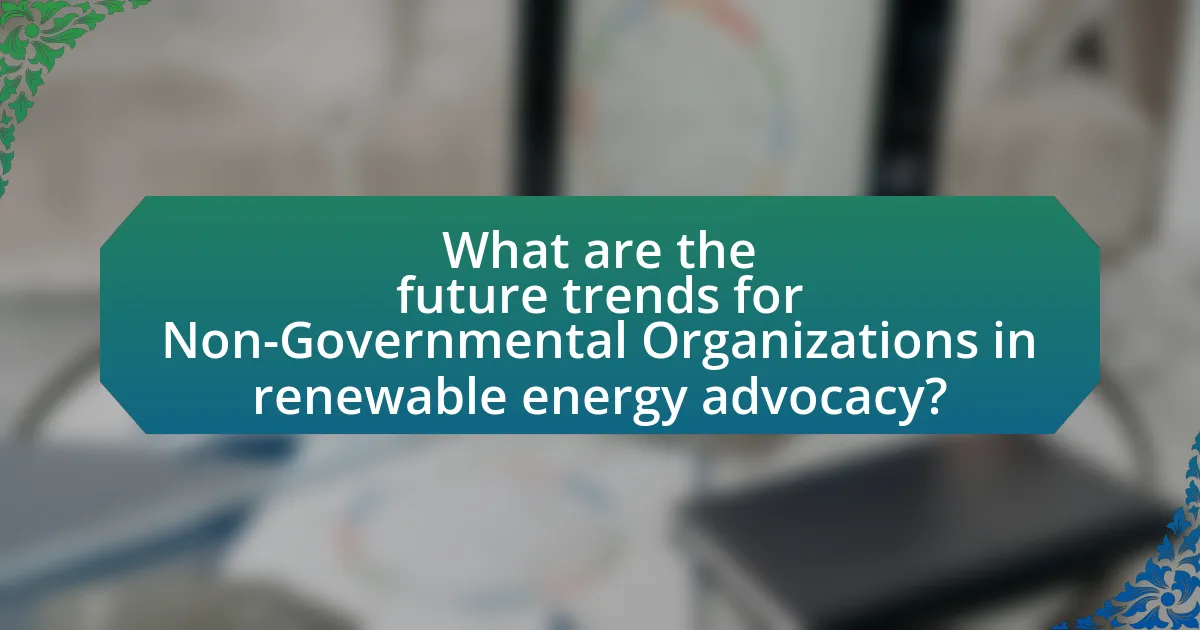
What are the future trends for Non-Governmental Organizations in renewable energy advocacy?
Non-Governmental Organizations (NGOs) in renewable energy advocacy are increasingly focusing on collaborative partnerships, technological innovation, and grassroots mobilization. These trends reflect a shift towards integrated approaches that leverage collective expertise and resources to drive sustainable energy solutions. For instance, NGOs are forming alliances with private sector companies and governmental bodies to enhance funding and implementation of renewable projects, as seen in initiatives like the Renewable Energy and Energy Efficiency Partnership (REEEP). Additionally, the adoption of digital tools and platforms is enabling NGOs to engage communities more effectively, facilitating awareness and education on renewable energy benefits. This trend is supported by the growing recognition of community-led initiatives, which have proven successful in various regions, such as the Solar Sister program in Africa, empowering women entrepreneurs in solar energy distribution.
How is technology shaping the work of NGOs in renewable energy?
Technology is significantly shaping the work of NGOs in renewable energy by enhancing their ability to collect data, engage communities, and implement sustainable solutions. For instance, NGOs utilize advanced data analytics and geographic information systems (GIS) to assess renewable energy potential in specific regions, allowing for targeted interventions. Additionally, mobile applications and online platforms facilitate community engagement and education, enabling NGOs to raise awareness about renewable energy benefits and gather public support. A notable example is the use of solar mapping tools, which help NGOs identify optimal locations for solar installations, thereby maximizing impact and efficiency. These technological advancements not only streamline operations but also empower NGOs to advocate more effectively for renewable energy policies and practices.
What innovative approaches are NGOs adopting to enhance their impact?
NGOs are adopting innovative approaches such as leveraging technology, forming strategic partnerships, and utilizing data analytics to enhance their impact in global renewable energy advocacy. For instance, organizations like Greenpeace employ digital platforms to mobilize grassroots support and raise awareness about renewable energy issues, effectively reaching millions. Additionally, NGOs are collaborating with private sector companies to create sustainable energy solutions, exemplified by the partnership between the World Wildlife Fund and various corporations to promote renewable energy investments. Furthermore, data analytics enables NGOs to assess the effectiveness of their initiatives, allowing for real-time adjustments and improved outcomes, as seen in the work of the International Renewable Energy Agency, which uses data to inform policy recommendations.
How can NGOs leverage social media and digital platforms for advocacy?
NGOs can leverage social media and digital platforms for advocacy by creating targeted campaigns that raise awareness and mobilize support for renewable energy initiatives. These platforms allow NGOs to reach a global audience, engage with stakeholders, and share impactful stories and data that highlight the importance of renewable energy. For instance, a study by the Pew Research Center found that 69% of adults in the U.S. use social media, providing NGOs with a vast audience to influence public opinion and policy. Additionally, NGOs can utilize analytics tools to measure engagement and adapt their strategies in real-time, ensuring their advocacy efforts are effective and resonate with their audience.
What best practices can NGOs adopt for effective renewable energy advocacy?
NGOs can adopt several best practices for effective renewable energy advocacy, including building strong coalitions, leveraging data-driven campaigns, and engaging in community education. Strong coalitions enhance influence by uniting diverse stakeholders, which can amplify the message and reach of advocacy efforts. Data-driven campaigns utilize statistics and research to support arguments, making them more persuasive; for instance, the International Renewable Energy Agency reported that renewable energy could create 24 million jobs globally by 2030, providing a compelling case for investment. Engaging in community education fosters grassroots support and empowers individuals to advocate for renewable energy solutions, as seen in successful initiatives like the Solar Schools program in Australia, which educates students about solar energy while promoting its adoption.
How can NGOs measure the success of their advocacy efforts?
NGOs can measure the success of their advocacy efforts through specific metrics such as policy changes, public awareness levels, and stakeholder engagement. For instance, tracking the number of legislative bills influenced or passed as a result of advocacy campaigns provides a clear indicator of impact. Additionally, surveys assessing public awareness before and after campaigns can quantify shifts in perception regarding renewable energy issues. Engaging stakeholders, such as community members and policymakers, and measuring their participation in advocacy initiatives also reflects the effectiveness of outreach efforts. These methods are supported by studies indicating that successful advocacy often correlates with measurable changes in policy and public opinion, demonstrating the tangible outcomes of NGO efforts in promoting renewable energy.
What role does community engagement play in NGO strategies for renewable energy?
Community engagement is crucial in NGO strategies for renewable energy as it fosters local ownership, enhances project sustainability, and ensures that initiatives align with community needs. By involving community members in the planning and implementation phases, NGOs can gather valuable insights that lead to more effective and culturally appropriate solutions. For instance, a study by the International Renewable Energy Agency (IRENA) found that projects with strong community involvement are 30% more likely to succeed in the long term compared to those without. This engagement not only builds trust but also empowers communities to take an active role in the transition to renewable energy, ultimately leading to greater acceptance and support for such initiatives.
